|
De Amerikaanse dichter en schrijver John Robinson Jeffers werd geboren op 10 januari 1887 in Allegheny, nu Pittsburgh, Pennsylvania. Zie ook ook alle tags voor Robinson Jeffers op dit blog.
Hurt Hawks
I
The broken pillar of the wing jags from the clotted shoulder,
The wing trails like a banner in defeat,
No more to use the sky forever but live with famine
And pain a few days: cat nor coyote
Will shorten the week of waiting for death, there is game without talons.
He stands under the oak-bush and waits
The lame feet of salvation; at night he remembers freedom
And flies in a dream, the dawns ruin it.
He is strong and pain is worse to the strong, incapacity is worse.
The curs of the day come and torment him
At distance, no one but death the redeemer will humble that head,
The intrepid readiness, the terrible eyes.
The wild God of the world is sometimes merciful to those
That ask mercy, not often to the arrogant.
You do not know him, you communal people, or you have forgotten him;
Intemperate and savage, the hawk remembers him;
Beautiful and wild, the hawks, and men that are dying, remember him.
II
I'd sooner, except the penalties, kill a man than a hawk;
but the great redtail
Had nothing left but unable misery
From the bone too shattered for mending, the wing that trailed under his talons when he moved.
We had fed him six weeks, I gave him freedom,
He wandered over the foreland hill and returned in the evening, asking for death,
Not like a beggar, still eyed with the old
Implacable arrogance.
I gave him the lead gift in the twilight.
What fell was relaxed, Owl-downy, soft feminine feathers; but what
Soared: the fierce rush: the night-herons by the flooded river cried fear at its rising
Before it was quite unsheathed from reality.
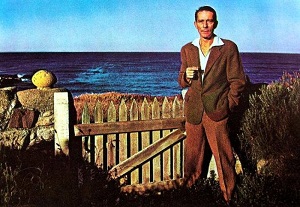
Robinson Jeffers (10 januari 1887 – 20 januari 1962)
De Duitstalige, uit Namibië stammende, schrijver Giselher Werner Hoffmann werd geboren op 10 januari 1958 in Windhoek. Zie ook alle tags voor Giselher Werner Hoffmann op dit blog.
Uit: Schattenjäger
„Als es Abend wurde, bog Kondjoura vom Elefantenpfad in den angrenzenden Mopanewald ab. Er schlängelte sich an den knorrigen, im Schatten ruhenden Stämmen vorüber und stieß hinter dem schmalen Laubgürtel auf den Kunene. Frische Rinderfährten und die Spuren von Hirten führten zum Ufer hinunter, und in der Mitte des Grenzflusses zwischen Namibia und Angola strömte das Wasser gurgelnd über eine Felsenbank. Der Kunene war an dieser Stelle nicht mehr als siebzig Schritte breit. Kondjoura legte den Hirtenstab fort, löste den Knoten in seinem Leibriemen, ließ ihn samt den beiden schwarzen, kalbsledernen Lendenschurzen und dem Tragebeutel auf den Boden fallen und schleuderte die Sandalen aus Giraffenleder von seinen Füßen. Dann näherte er sich dem Fluß. Das Ufer war mit rundgeschliffenen Steinen übersät, so daß er sich an dem mannshohen Schilf festhalten mußte. Kaum hatte er einen Schritt in das milchiggrüne Wasser getan, begann der Strom an seinen Beinen zu zerren. Er hockte sich zwischen zwei Felsen und schloß die Augen. Der Fluß belebte ihn, so wie er auch seine Urahnen belebt hatte, als die Herero zu Beginn des 16. Jahrhunderts aus der angolanischen Provinz Mocamedes gen Süden gezogen, den Kunene überquert und ihn auf ihrer Wanderung in das nordwestliche Grenzgebiet des heutigen Namibias zu ihrer Rechten - okunene - gelassen hatten.“
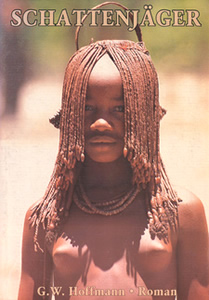
Giselher Werner Hoffmann (Windhoek, 10 januari 1958)
De Nederlandse dichter en schrijver Jan H. Eekhout werd geboren op 10 januari 1900 in Sluis. Zie ook alle tags voor Jan H. Eekhout op dit blog en alle tags voor Jan Eekhout op dit blog.
Bekentenis
Heer, Heer, den dag lang hijgen onze tochten
voorbij aan U, Die eens ons oogen zochten.
Heer, U voorbij vermoedt ons wringend denken,
in armelijken waan, een groot doel wenken.
Heer, elk van ons aanschouwt een ijdel wonder
en drijft zichzelven blindelings ten onder.
En Gij, Gij zijt in eind'loos droef bezinnen
en huivert, God, om machteloos beminnen.
Doch strekkend, Heer, de moegejaagde leden
richt menig onzer nog tot U zijn beden.
Gij weet, o God, hun saamgekrampte handen
en bin hun eenzaam hart dat schroeiend branden.
Want als de nachtwind ruizelt door het loover
buigt Gij U zacht, Heer, tot mijn leven over.
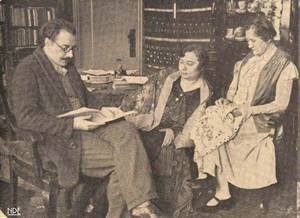
Jan H. Eekhout (10 januari 1900 – 6 maart 1978)
Hier met echtgenote en schoonmoeder
De Chileense dichter Vicente García-Huidobro Fernández werd op 10 januari 1893 geboren in Santiago. Zie ook alle tags voor Vincente Huidobro op dit blog.
Storm
Stormy night
The darkness bites my head
The devils
who drive the thunder
are having their vacation
No one goes by in the street
She hasn't come
Something
fell in the corner
The clock
stopped
Hours
A small town
A train stopped on the plain
Deaf stars sleep
in every puddle
And the water trembles
Curtains to the wind
Night hangs in the grove
A lively drizzle
From the flower-covered steeple
Bleeds the stars
Now and then
Ripe hours
Drop on life
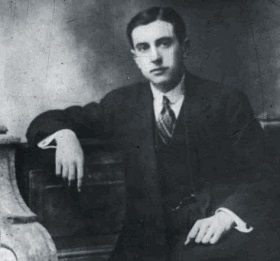
Vicente Huidobro (10 januari 1893 – 2 januari 1948)
De Ierse dichter en criticus Aubrey Thomas de Vere werd geboren in Adare, County Limerick, op 10 januari 1814. Zie ook alle tags voor Aubrey Thomas de Vere op dit blog.
The 'Washing Of The Feet,' On Holy Thursday, In St. Peter's
Once more the temple-gates lie open wide:
Onward, once more,
Advance the Faithful, mounting like a tide
That climbs the shore.
What seek they? Blank the altars stand today,
As tombstones bare:
Christ of his raiment was despoiled; and they
His livery wear.
Today the puissant and the proud have heard
The 'mandate new':
That which He did, their Master and their Lord,
They also do.
Today the mitred foreheads, and the crowned,
In meekness bend:
New tasks today the sceptred hands have found;
The poor they tend.
Today those feet which tread in lowliest ways,
Yet follow Christ,
Are by the secular lords of power and praise
Both washed and kissed.
Hail, ordinance sage of hoar antiquity,
Which She retains,
That Church who teaches man how meek should be
The head that reigns!
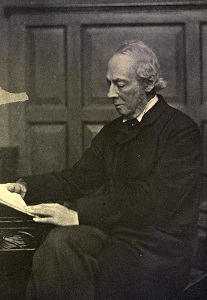
Aubrey Thomas de Vere (10 januari 1814 - 20 januari 1902)
De Russische schrijver Alexei Tolstoy werd geboren op 10 januari 1883 in Sosnovka. Zie ook alle tags voor Alexei Tolstoy op dit blog.
Uit:Ordeal (Vertaald door Ivy en Tatiana Litinov)
"...We are faced with the necessity of carrying out a revolu-tionary socialist task, and there are enormous difficulties in our way. Our epoch is one of bitter Civil War... It is only by defeating the counter-revolution, by pursuing a socialist policy in regard to famine, and by the struggle against it, that we shall conquer both famine and the counter-revolutionaries exploiting famine..."
One of his hands flew out of the armhole of his waistcoat, as if to annihilate an invisible foe, and remained suspended over the audience.
"...When the workers, their wits fuddled by the slogans of the profiteers, clamour for the unrestricted sale of grain, the import of motor lorries and other transport machinery, we reply to them that this means to go to the aid of the kulaks... We will never take that path... We will seek the support of the workers, with whom we gained the victory in October, we will carry our decisions through only by means of imposing proletarian discipline upon all sections of workers. We are faced with a historic task. And we will fulfil it... The most fundamental of all questions - that of bread - is dealt with in the latest decrees. These are all based upon three ruling principles. The first is the principle of centrali-sation, or the combining of all for a single, common task under guidance from the centre... There are many who point out to us that the grain monopoly is being thwarted at every step by private buyers and profiteers. Intellectuals keep saying that the profiteers are doing them a great service, are keeping them alive... Yes, that is so... But the private traders are doing it in the kulak way, the way that will lead to the consolidation, the establishment, the perpetuation of kulak power..."
The hand, with sweeping gesture, wiped out a situation that would never again be tolerated.
"Our second slogan is the unity of the workers. It is they who will rescue Russia from the desperate, stupendous difficulties in which she finds herself. We will call to our aid the organisations of workers' food detachments, of the starving people from the non-agricultural famine areas, it is to them that our Commissariat for Supplies will address itself, and upon them that we will call to join our crusade for bread!"
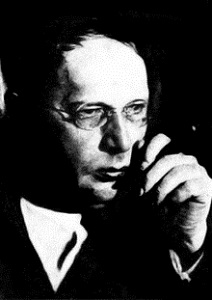
Alexei Tolstoy (10 januari 1883 – 23 februari 1945)
|



